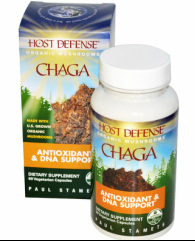 ORGANIC CHAGA CAPSULES
ORGANIC CHAGA CAPSULES Chaga, a 'mushroom' which grows on birch trees, is rich in natural antioxidant and anti-inflammatory phenols.
The most nutritionally dense of all tree growths, Chaga contains the compounds betulin and betulinic acid – which derive directly from the host birch tree.
According to medical writer, Chris Kilham, both betulin and betulinic acid demonstrate anti-tumor effects, which explain why Chaga is known as an anti-cancer agent.
Additionally, some science shows that betulin can play a beneficial role in controlling metabolic disorders, such as obesity and metabolic syndrome.
A group of compounds in Chaga called lanostanoids also appear to play significant anti-cancer roles.
The exact anti-cancer activity of chaga is not completely understood, but some compounds in the fungus boost immune activity, some specifically prevent cancer cells from replicating, and others cause premature cancer cell death.
This argues for the utilization of a whole chaga extract, rather than isolating a single compound. In Chaga, many agents appear to be active against cancer.
Nutrition Density: Vitamins, Minerals & Enzymes
Known as 'the diamond of the forest' chaga was regarded by the ancient Chinese as a potent longevity factor. It contains numerous B vitamins, flavonoids, phenols, minerals, and enzymes.
It is also one of the world’s densest sources of pantothenic acid, and this vitamin is needed by the adrenal glands as well as digestive organs. It additionally contains riboflavin and niacin in significant amounts.
Chaga contains wild-source minerals as well and is particularly high in copper, calcium, potassium, manganese, zinc, and iron.
Yet, its most potent ingredient is a special substance known as superoxide dismutase (SOD). This is an enzyme with great potency. Its function is to halt oxidation, especially the toxicity of a free radical
http://www.chagaknowledge.com/chagabenefits.htm
 RSS Feed
RSS Feed